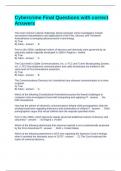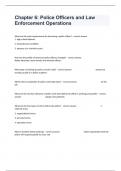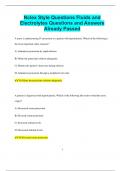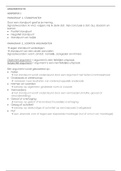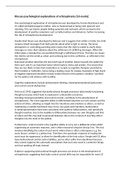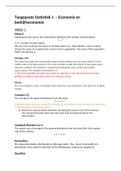Answers
The most common judicial challenges facing computer crime investigators include
inconsistent interpretations and applications of the First, Second, and Thirteenth
Amendments to emerging advancements in technology.
A) True
B) False - answer B
Prior to the 1950s, traditional notions of decency and obscenity were governed by an
obscenity statute originally developed in 1868 in Regina v. Hicklin.
A) True
B) False - answer A
The Court held in Sable Communications, Inc. v. FCC and Turner Broadcasting System,
Inc. v. FCC that telephone communications and cable broadcasts are entitled to the
same level of First Amendment protection.
A) True
B) False - answer B
The Communications Decency Act criminalized any obscene communication to a minor
recipient.
A) True
B) False - answer A
Which of the following Constitutional Amendments poses the fewest challenges to
computer crime investigators faced with interpreting and applying it? - answer the
Fifth Amendment
How has the advent of electronic communications helped child pornographers defy the
existing broad laws regarding indecency and victimization of children? - answer Child
pornographers argue that virtual children lack the requisite specified victim.
Prior to the 1950s, which obscenity statute governed traditional notions of decency and
obscenity? - answer A) Regina v. Hicklin
Which of the following determined that obscene material is not constitutionally protected
by the First Amendment? - answer Roth v. United States
Which of the following statements is NOT true regarding the Supreme Court's findings
when it revisited the obscenity issue in 1973? - answer C) The Court endorsed the
notion of universal decency.
, The Supreme Court in New York v. Ferber held that states are granted more leeway in
the regulation of pornographic depictions of children than in the regulation of obscenity
because the use of children as subjects of pornographic materials is harmful to the
physiological, emotional, and mental health of the child.
A) True
B) False - answer A
Beginning with which case has the Supreme Court ruled that new media of
communication must be scrutinized as they are developed and that varying media result
in varying protections? - answer FCC v. Pacifica Foundation
Which of the following is NOT a reason for the Supreme Court's ruling that the broad-
based nature of radio communication mandated a greater level of scrutiny when
broadcasting programs that contained probable indecent speech? - answer A) The
medium is available cheaply to people.
Which of the following reasons was NOT cited for ruling that George Carlin's broadcast
monologue Filthy was not entitled to First Amendment protection? - answer B)
depiction of children as victims of sexual exploitation
Which of the following is the first act specifically aimed at protecting families and
children from online sexually explicit materials? - answer C) Communications
Decency Act
Which of the following was the ground for the court to invalidate the Communications
Decency Act? - answer its overbreadth and vagueness
In which of the following cases did the Court specifically rely on statistics and opinions
gathered from sources ranging from scholars to law enforcement practitioners in order
to arrive at a conclusion, marking a clear departure from the normal procedure? -
answer New Yorker v. Ferber
Which of the following statements holds true regarding Osborne v. Ohio? - answer B)
The Court finally established a standard of scienter that had been lacking until then.
Which of the following Acts replaced the Protection of Children against Sexual
Exploitation Act of 1977, in an effort to tighten prohibitions of child pornography on the
federal level? - answer C) Child Protection Act
Which of the following was enacted to prohibit virtual child pornography, arguing in part
that the very existence of child pornography, real or not, increased child molestation and
pedophilia? - answer Child Pornography Prevention Act
What makes Child Pornography Prevention Act (CPPA) different from Child Protection
Act (CPA)? - answer A) CPPA prohibited the production and distribution of

